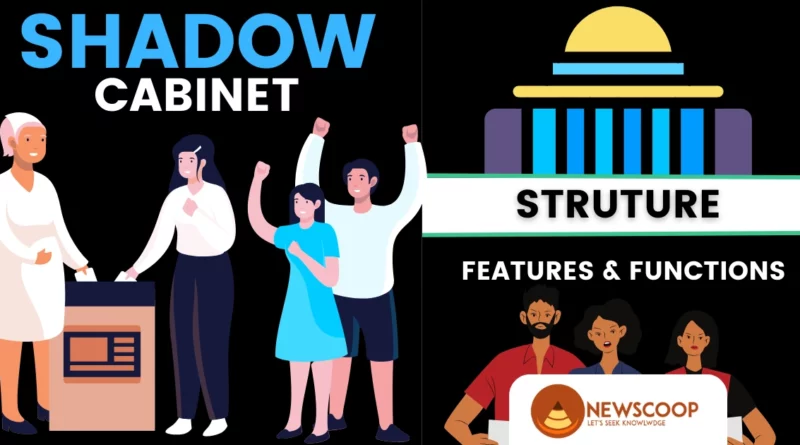Shadow Cabinet: Origin & Functions in India
In parliamentary democracies around the world, the concept of a shadow cabinet plays a crucial role in the functioning of the opposition party. While the term “shadow cabinet” might evoke a sense of mystery, it is an essential component of the political landscape.
In this article, we will shed light on the shadow cabinet, its purpose, structure, and the role it plays in the democratic process.
What is a Shadow Cabinet?
The shadow cabinet is a group of senior opposition party members who mirror the positions and responsibilities of the government’s cabinet ministers. Each shadow minister is assigned to shadow, scrutinize, and challenge the policies, decisions, and actions of their respective government counterparts. This system fosters a healthy and robust democracy by providing an alternative voice and holding the ruling party accountable.
Structure & Selection of the Shadow Cabinet
- The shadow cabinet is structured to mirror the government’s cabinet.
- It typically includes key positions aligned with ministerial portfolios.
- The leader of the opposition has the authority to appoint shadow ministers.
- The number of shadow ministers may vary depending on the opposition party’s size and structure.
- Shadow ministers are selected based on expertise, experience, and qualifications in relevant policy areas.
- Party loyalty and commitment to the party’s values are considered during selection.
- Shadow ministers work closely with policy teams and advisors within their party.
- Rotation and promotion within the shadow cabinet may occur to provide opportunities and fresh perspectives.
- Effective communication and coordination among shadow ministers are essential for cohesive functioning.
- The structure and selection process plays a crucial role in ensuring the shadow cabinet’s effectiveness in holding the government accountable.
Purpose & Functions of the Shadow Cabinet
- Policy Scrutiny: The primary function of the shadow is to closely examine the government’s policies, proposals, and legislative actions. They analyze the potential impacts, identify flaws or weaknesses, and propose alternative solutions to address the concerns of the opposition.
- Alternative Government: The shadow cabinet serves as an alternative government in waiting. By formulating and articulating their own policy positions, the opposition demonstrates to the electorate that they are prepared to govern if given the opportunity.
- Public Accountability: Shadow ministers actively engage with the public, media, and other stakeholders to highlight government shortcomings, challenge decisions, and offer alternative perspectives. This fosters transparency and ensures that the government remains accountable to the electorate.
History & Origin of Shadow Cabinet
The history of the Shadow Cabinet can be traced back to the emergence of organized political opposition within parliamentary systems. It originated in the United Kingdom and has since become an integral part of democratic governance in various countries.
The roots of the Shadow Cabinet can be found in the 18th and 19th centuries when political parties began to take shape. In the United Kingdom, the Whigs and Tories emerged as the two major parties, vying for power and influence in Parliament. As these parties grew, there was a need for an organized opposition that could challenge the policies of the ruling party.
While the concept of a shadow minister or spokesperson existed before, the term “Shadow Cabinet” was officially used in the early 20th century in the United Kingdom. This marked a formalization of the opposition’s structure, as senior members of the opposition party were appointed to mirror the positions of government ministers. It was established to present a cohesive alternative to the government’s policies and to scrutinize their actions.
Advantages of the Shadow Cabinet
The following are the advantages of shadow cabinet:
- Accountability: Holds the government accountable.
- Policy scrutiny: Analyzes and questions government policies.
- Alternative government: Ready to govern if given the opportunity.
- Constructive criticism: Provides feedback for better decision-making.
- Public representation: Voices concerns of opposition supporters.
- Talent development: Nurtures emerging leaders within the party.
- Strengthens democracy: Provides checks and balances.
- Continuity of governance: Ensures smooth transitions in leadership.
Disadvantages of the Shadow Cabinet
The following are the disadvantages of shadow cabinets:
- Limited decision-making power.
- Lack of executive experience.
- Partisan approach and political point-scoring.
- Limited resources and support staff.
- Limited media coverage and visibility.
- Internal divisions and power struggles.
- Variable influence on government decisions.
- Questioned effectiveness and public perception.
Role in Parliamentary Debates
Role in Parliamentary Debates and Legislation:
- The shadow cabinet plays a significant role in parliamentary debates and legislation as the official opposition to the government.
- Shadow ministers actively participate in debates, offering alternative viewpoints and challenging the government’s policies and proposals.
- They scrutinize government legislation, raise concerns, propose amendments, and highlight potential flaws or unintended consequences.
- Shadow ministers provide constructive criticism and present alternative policy options during the legislative process.
- They engage in discussions and negotiations with government ministers, aiming to shape and improve proposed legislation.
- Shadow ministers also have the opportunity to present their own policy proposals and private member bills, contributing to the broader legislative agenda.
- Its role in parliamentary debates and legislation is vital in ensuring a robust democratic process, promoting accountability, and representing the interests of the opposition and their constituents.
- Their active involvement helps to foster informed and balanced decision-making by thoroughly examining and challenging the government’s legislative agenda.
Conclusion
The shadow cabinet plays a crucial role in parliamentary democracies, serving as a vital check and balance on the ruling government. By scrutinizing policies, proposing alternatives, and holding the government accountable, the shadow cabinet contributes to the healthy functioning of democracy.
While it is not without criticisms, its existence ensures a vibrant political landscape that upholds the principles of transparency, accountability, and robust debate.
Thank You!

